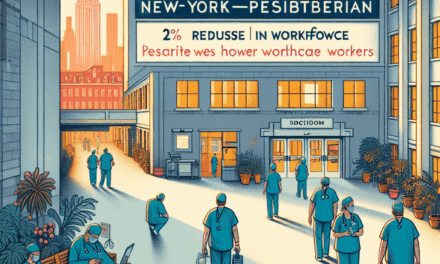UnitedHealth and Amedisys Postpone $3.3B Merger Closing Date
The healthcare landscape is constantly evolving, with mergers and acquisitions playing a significant role in shaping the industry. One of the most notable recent developments is the postponement of the $3.3 billion merger between UnitedHealth Group and Amedisys, a leading provider of home health care services. This article delves into the reasons behind the delay, the implications for both companies, and the broader impact on the healthcare sector.
Understanding the Merger: An Overview
The proposed merger between UnitedHealth Group, a diversified health care company, and Amedisys, which specializes in home health care and hospice services, was initially announced with great anticipation. The merger aimed to create a more integrated healthcare delivery system, enhancing patient care while reducing costs. However, the postponement of the merger’s closing date has raised questions about the future of this strategic alliance.
The Strategic Rationale Behind the Merger
UnitedHealth Group has long been focused on expanding its services to meet the growing demand for home-based care. The COVID-19 pandemic accelerated this trend, as many patients preferred receiving care in the comfort of their homes rather than in traditional healthcare settings. Amedisys, with its extensive experience in home health care, was seen as a perfect fit for UnitedHealth’s strategy.
- Market Expansion: The merger would allow UnitedHealth to expand its footprint in the home health care market, which is projected to grow significantly in the coming years.
- Integrated Care: By combining resources, the two companies aimed to provide a more seamless care experience for patients, improving outcomes and satisfaction.
- Cost Efficiency: The merger was expected to create synergies that would reduce operational costs, benefiting both companies financially.
However, the complexities of merging two large organizations, especially in the highly regulated healthcare sector, cannot be underestimated. Regulatory approvals, integration challenges, and cultural alignment are just a few of the hurdles that can delay or derail such mergers.
Regulatory Scrutiny and Compliance Challenges
One of the primary reasons for the postponement of the merger’s closing date is the increased regulatory scrutiny that has become commonplace in the healthcare industry. Regulatory bodies, including the Federal Trade Commission (FTC) and state health departments, closely monitor mergers and acquisitions to ensure they do not create monopolistic practices or reduce competition.
- Antitrust Concerns: The merger raised potential antitrust issues, as it could significantly alter the competitive landscape in the home health care market.
- State Regulations: Each state has its own regulations governing healthcare providers, which can complicate the approval process.
- Public Sentiment: Growing public concern over healthcare costs and access may lead regulators to scrutinize mergers more closely.
As a result, both UnitedHealth and Amedisys have had to navigate a complex web of regulatory requirements, which has contributed to the delay in finalizing the merger. The companies are working diligently to address these concerns and secure the necessary approvals.
The Financial Implications of the Postponement
The postponement of the merger has significant financial implications for both UnitedHealth and Amedisys. Investors and analysts are closely monitoring the situation, as the delay could impact stock prices, revenue projections, and overall market confidence.
Impact on Stock Prices and Market Valuation
When the merger was first announced, both companies experienced a surge in their stock prices, reflecting investor optimism about the potential benefits of the merger. However, the postponement has led to increased volatility in their stock valuations.
- Investor Sentiment: Delays in mergers can lead to uncertainty among investors, causing stock prices to fluctuate.
- Market Reactions: Analysts have adjusted their forecasts for both companies, which can further impact stock performance.
- Long-term Projections: The delay may lead to revised long-term growth projections, affecting investor confidence.
For UnitedHealth, which has a diverse portfolio of services, the impact may be less pronounced. However, Amedisys, being more reliant on the merger for growth, may face more significant challenges in maintaining investor confidence during this period of uncertainty.
Operational Costs and Financial Performance
The postponement of the merger also raises questions about the operational costs for both companies. Mergers often lead to cost synergies that can improve financial performance, but delays can hinder these potential benefits.
- Integration Costs: Both companies have likely incurred costs related to the merger process, including legal fees and advisory services.
- Operational Disruptions: Uncertainty surrounding the merger can lead to disruptions in day-to-day operations, impacting service delivery and patient care.
- Future Investments: The delay may affect both companies’ ability to invest in new technologies and services, which are crucial for staying competitive in the healthcare market.
As a result, both UnitedHealth and Amedisys must carefully manage their financial performance during this period to maintain investor confidence and ensure long-term growth.
Market Reactions and Stakeholder Perspectives
The postponement of the merger has elicited a range of reactions from various stakeholders, including investors, analysts, healthcare professionals, and patients. Understanding these perspectives is crucial for assessing the broader implications of the merger delay.
Investor Reactions and Analyst Opinions
Investors have expressed mixed feelings about the postponement of the merger. While some view it as a temporary setback, others are concerned about the long-term viability of the merger and its potential impact on stock performance.
- Short-term Concerns: Many investors are worried about the immediate financial implications of the delay, particularly for Amedisys.
- Long-term Outlook: Some analysts maintain a positive outlook on the merger, believing that once regulatory hurdles are cleared, the combined entity will be well-positioned for growth.
- Market Sentiment: Overall market sentiment can influence investor behavior, leading to increased volatility in stock prices.
Analysts are closely monitoring the situation, providing updates and insights to help investors navigate the uncertainty surrounding the merger. Their assessments will play a crucial role in shaping investor sentiment in the coming months.
Healthcare Professionals and Patient Perspectives
Healthcare professionals and patients also have a vested interest in the outcome of the merger. For healthcare providers, the merger could lead to improved care coordination and access to resources, while patients may benefit from enhanced services and support.
- Care Coordination: Many healthcare professionals believe that the merger could lead to better care coordination, particularly for patients with chronic conditions.
- Access to Services: Patients may benefit from increased access to home health care services, which have become increasingly important in the wake of the pandemic.
- Quality of Care: Concerns about the quality of care during the integration process may arise, as both companies work to align their operations.
As the merger process unfolds, it will be essential for both UnitedHealth and Amedisys to communicate effectively with healthcare professionals and patients to address any concerns and ensure a smooth transition.
The Future of Home Health Care: Trends and Predictions
The postponement of the UnitedHealth and Amedisys merger comes at a time when the home health care industry is experiencing significant growth and transformation. Understanding the trends shaping this sector is crucial for assessing the long-term implications of the merger delay.
Growing Demand for Home-Based Care
The demand for home-based care has surged in recent years, driven by several factors, including an aging population, advances in technology, and changing patient preferences. This trend is expected to continue, creating opportunities for companies like UnitedHealth and Amedisys.
- Aging Population: The U.S. Census Bureau projects that by 2030, all baby boomers will be older than 65, leading to increased demand for home health services.
- Technological Advancements: Innovations in telehealth and remote monitoring are making it easier for patients to receive care at home.
- Patient Preferences: Many patients prefer receiving care in their homes, leading to a shift in how healthcare services are delivered.
As the demand for home-based care continues to grow, companies that can effectively navigate the regulatory landscape and provide high-quality services will be well-positioned for success.
Technological Innovations in Home Health Care
Technology is playing a pivotal role in transforming home health care. From telehealth platforms to remote monitoring devices, innovations are enhancing patient care and improving outcomes.
- Telehealth Services: The rise of telehealth has made it easier for patients to access care from the comfort of their homes, reducing the need for in-person visits.
- Remote Monitoring: Devices that monitor patients’ vital signs and health conditions in real-time are becoming increasingly common, allowing for proactive care management.
- Data Analytics: Advanced data analytics can help healthcare providers identify trends and improve care delivery, leading to better patient outcomes.
As UnitedHealth and Amedisys work towards finalizing their merger, leveraging these technological innovations will be crucial for enhancing their service offerings and improving patient care.
Conclusion: Key Takeaways and Future Outlook
The postponement of the $3.3 billion merger between UnitedHealth and Amedisys has significant implications for both companies and the broader healthcare landscape. As they navigate regulatory challenges and address stakeholder concerns, several key takeaways emerge:
- Regulatory Scrutiny: The healthcare industry is under increased regulatory scrutiny, making it essential for companies to navigate compliance challenges effectively.
- Financial Implications: The delay has financial implications for both companies, impacting stock prices, operational costs, and long-term growth projections.
- Stakeholder Perspectives: Understanding the perspectives of investors, healthcare professionals, and patients is crucial for managing expectations and ensuring a smooth transition.
- Future of Home Health Care: The demand for home-based care is expected to grow, driven by an aging population and technological advancements.
- Technological Innovations: Leveraging technology will be key for enhancing service offerings and improving patient care in the home health care sector.
As UnitedHealth and Amedisys work towards finalizing their merger, their ability to address these challenges and capitalize on emerging opportunities will determine their success in the evolving healthcare landscape. The future of home health care is bright, and companies that can adapt to changing market dynamics will thrive in this competitive environment.





